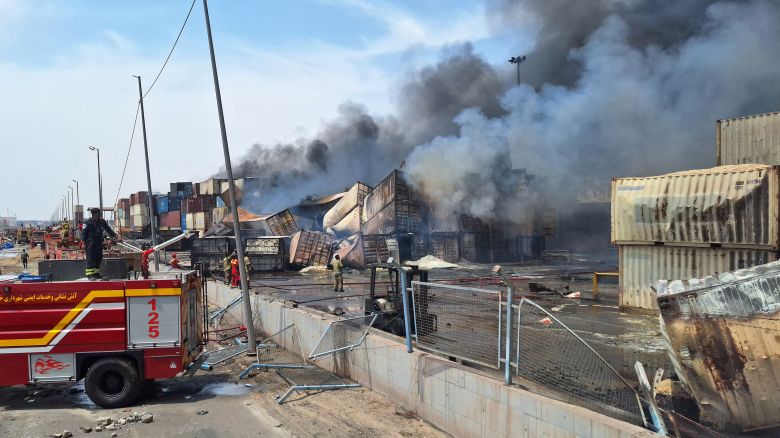image:gettyimage
In the wake of a deadly explosion at an Iranian port facility, Tehran has maintained strict silence on the exact cause, even as regional observers and media outlets speculate about the possible presence of hazardous chemicals linked to missile fuel production. The incident has occurred during a period of heightened tensions across the Middle East, raising alarm about the broader implications for regional security.
Mysterious Explosion Rocks Iranian Port
On [date of explosion], a powerful blast shook a port in [specific location if known, e.g., Bandar Abbas], killing and injuring multiple people. Eyewitnesses described a massive fireball followed by thick plumes of black smoke towering over the docks. Initial reports from local media cited an industrial accident involving flammable materials; however, the Iranian authorities have provided little concrete information, fueling widespread speculation.
According to [semi-official news outlet or agency], Iranian officials were quick to deny any military link to the port’s activities. “There were no military materials or missile components stored at the port at the time of the incident,” an unnamed government spokesperson told [news agency].
Despite the official stance, questions linger.
Speculation Over Missile Fuel Components
Several regional intelligence sources, quoted by outlets such as Al Arabiya and Reuters, suggest the possibility that the explosion involved volatile chemicals often used in the manufacture of missile fuel. Materials such as ammonium perchlorate, a powerful oxidizer, are commonly found in solid rocket propellants.
An unnamed Middle Eastern diplomat speaking to The Jerusalem Post alleged that satellite imagery taken shortly before the blast showed “unusual levels of security” at the port site, hinting at the storage of sensitive materials. While the claim remains unverified, it has added weight to concerns that Iran might have been quietly storing dual-use chemicals — substances with both civilian and military applications — at civilian infrastructure points.
If proven true, the presence of missile fuel components at a commercial port would represent a serious violation of international safety standards and could explain Tehran’s reluctance to release detailed findings.
Iran’s Pattern of Secrecy
Iran’s handling of the port explosion mirrors previous incidents where the government opted for opacity. Notably, after the July 2020 blast at the Natanz nuclear facility, authorities initially downplayed the incident before admitting that significant damage had occurred.
Similarly, the 2020 downing of Ukrainian International Airlines Flight 752 was initially denied by Iran before the military conceded to shooting down the plane “by mistake” amid heightened tensions with the United States.
“This latest event fits a recognizable pattern where the Iranian government seeks to control the narrative following major incidents,” said Dr. Ellie Geranmayeh, a senior policy fellow at the European Council on Foreign Relations.
Timing Could Not Be Worse
The explosion comes as tensions in the Middle East are surging. Ongoing conflicts involving Israel, Hezbollah, and Hamas, combined with Western accusations of Iranian arms shipments to proxy groups, have turned the region into a powder keg.
The Biden administration has recently increased sanctions against Iranian missile development programs, while Israel has repeatedly warned that it would act against any Iranian effort to transfer advanced weapons to its allies.
A senior Israeli official, speaking to Axios, hinted that “Iran’s military entrenchment efforts are being closely monitored,” adding that any development involving missile capabilities would be considered a red line.
Against this backdrop, even an accidental explosion involving missile-related materials could have severe diplomatic consequences, potentially leading to escalation.
Environmental and Civilian Risks
Beyond the immediate loss of life, the explosion raises serious concerns about environmental contamination. Chemicals used in rocket fuels, if released into the atmosphere or water supplies, can have devastating effects on human health and marine ecosystems.
Dr. Farideh Mozaffari, an Iranian environmental scientist based in Europe, expressed alarm: “If chemicals like ammonium perchlorate were indeed involved, we could be looking at long-term soil and water contamination issues, especially if emergency containment measures were insufficient.”
Iran has faced criticism in the past for lax environmental and industrial safety standards, including a string of refinery fires and chemical plant accidents. Calls for greater transparency and stronger regulatory frameworks are likely to grow louder in the coming weeks.
International Reactions
As of now, no major international body has officially commented on the Iranian port explosion. However, watchdog groups like the International Atomic Energy Agency (IAEA) and the Organization for the Prohibition of Chemical Weapons (OPCW) are reportedly monitoring the situation closely.
The United Nations Special Coordinator for the Middle East Peace Process has also warned that “any event contributing to instability in the region at this critical time must be taken extremely seriously.”
Meanwhile, Iranian state media continues to downplay the incident, focusing coverage instead on relief efforts and recovery operations.
Conclusion
Iran’s silence regarding the true cause of the deadly port explosion has only fueled speculation about the presence of military-related materials, potentially linked to missile programs. Given the current geopolitical climate, transparency is more critical than ever. Without clear answers, Tehran risks not only further isolation on the world stage but also domestic unrest, as Iranian citizens demand accountability.
As the Middle East teeters on the brink of broader conflict, even seemingly isolated incidents like this deadly blast carry enormous weight. The world will be watching closely for Iran’s next move.
References:
- Reuters – Iran denies storing military equipment at port
- Al Arabiya English – Reports of chemical materials at Iranian port
- The Jerusalem Post – Explosion linked to missile chemicals
- European Council on Foreign Relations
- International Atomic Energy Agency (IAEA)
- Organization for the Prohibition of Chemical Weapons (OPCW)
- Axios – Israel monitoring Iran’s missile activities
